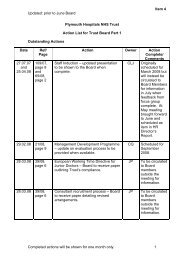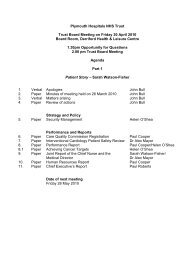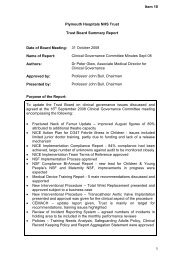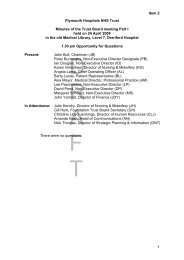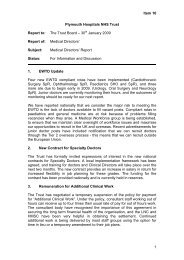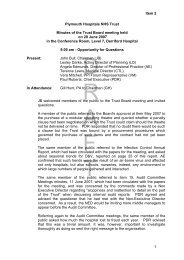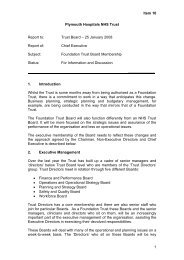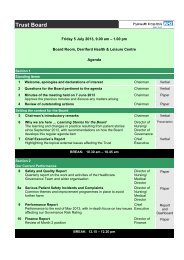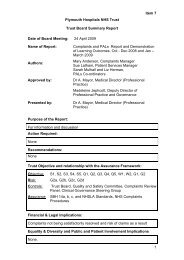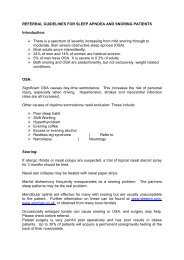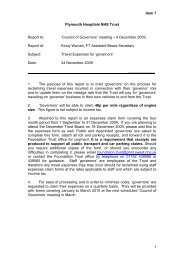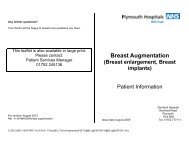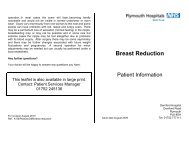Standards of business conduct for NHS staff - Liverpool Community ...
Standards of business conduct for NHS staff - Liverpool Community ...
Standards of business conduct for NHS staff - Liverpool Community ...
You also want an ePaper? Increase the reach of your titles
YUMPU automatically turns print PDFs into web optimized ePapers that Google loves.
Management<br />
Executive<br />
!<br />
<strong>Standards</strong> <strong>of</strong> <strong>business</strong> conuuct <strong>for</strong><br />
<strong>staff</strong><br />
Business<br />
Executive Summary<br />
To assist <strong>NHS</strong> employers and <strong>staff</strong> in maintaining strict ethical standards in the<br />
<strong>conduct</strong> <strong>of</strong> <strong>NHS</strong> <strong>business</strong>, the Management Executive has prepared the attached<br />
guidance:.<br />
January 1993<br />
replaces<br />
cancelled<br />
which<br />
Action<br />
Brief summary <strong>of</strong> the main provisions <strong>of</strong> the Prevention <strong>of</strong> Corruption<br />
Acts and -Part A.<br />
General policy guidelines Part B.<br />
These cover:<br />
the standards <strong>conduct</strong> expected <strong>of</strong> all <strong>NHS</strong> <strong>staff</strong> where their<br />
private interests may conflict with their public duties; and<br />
the steps which <strong>NHS</strong> employers should take to safeguard<br />
themselves and the <strong>NHS</strong> against conflict <strong>of</strong> interest.<br />
Action checklist <strong>for</strong> <strong>NHS</strong> Managers Part C.<br />
Short guide <strong>for</strong> <strong>staff</strong> - Part D.<br />
Ethical Code <strong>of</strong> the Institute <strong>of</strong> Purchasing and Supply (IPS) (reproduced<br />
courtesy <strong>of</strong> IPS) Part E.<br />
<strong>NHS</strong> authorities and Trusts should:<br />
ensure that these guidelines are brought to the attention <strong>of</strong> all <strong>staff</strong>, and<br />
are effectively implemented;<br />
develop local conflict interest policies and the machinery to<br />
implement them, in consultation with <strong>staff</strong> and local <strong>staff</strong> representatives:<br />
satisfy themselves that their policies and implementation procedures are<br />
regularly reviewed and kept up to date.<br />
Cor action:<br />
Health Authorities<br />
HealthAuthorities<br />
Health Authorities <strong>for</strong><br />
Postgraduate<br />
reaching Hospitals<br />
UHS Supplies Authority<br />
UHS Trusts<br />
Managed Units<br />
Health Services<br />
Central Blood<br />
Authority<br />
Dental Practice Board<br />
rhe Prescription Pricing<br />
Special Hospitals Service<br />
Public Health Laboratory<br />
Board<br />
UHSTraining Directorate<br />
Education Authority<br />
in<strong>for</strong>mation:<br />
Health<br />
Councils<br />
Metropolitan District Councils<br />
Borough Councils<br />
<strong>NHS</strong>ME Personnel Directorate<br />
Hill<br />
7UE<br />
Tel: 0532-545000ext 45764<br />
Further copies <strong>of</strong> this document<br />
may obtained by writingto<br />
Store<br />
Health Publications Unit<br />
No 2 Site<br />
Manchester Road<br />
quote serial number appearing at<br />
the top <strong>of</strong> this column. Telephone<br />
enquiries will not be accepted.<br />
Crowncopyright 1993
E<br />
January 1993<br />
<strong>Standards</strong> <strong>of</strong><br />
<strong>business</strong> <strong>conduct</strong><br />
<strong>for</strong> <strong>NHS</strong> <strong>staff</strong><br />
Management<br />
Executive
.’,<br />
Prevention <strong>of</strong> Corruption Acts 1906 and 1916 summary <strong>of</strong> main provisions<br />
Part A<br />
3<br />
Acceptance <strong>of</strong><br />
by way <strong>of</strong> inducements or rewards<br />
1. Under the Prevention <strong>of</strong> Corruption Acts, and 1916, it is an <strong>of</strong>fence <strong>for</strong> employees<br />
corruptly to accept any gifts or consideration as an inducement or reward <strong>for</strong>:<br />
doing, or refraining from doing, anything in their <strong>of</strong>ficial capacity; or<br />
showing favour or disfavour to any person in their <strong>of</strong>ficial capacity.<br />
2 Under the Prevention <strong>of</strong> Corruption Act 1916, any money, gift or consideration received by an<br />
employee in public service from a person or organisation holding or seeking to obtain a contract<br />
will be deemed by the courts to have been received corruptly unless the employee proves the<br />
contrary.
Part B<br />
<strong>NHS</strong> Management Executive (<strong>NHS</strong>ME)<br />
general guidelines<br />
Introduction<br />
L These guidelines, which are intended by the <strong>NHS</strong>ME to be helpful to all <strong>NHS</strong> employers<br />
their employees, re-state and rein<strong>for</strong>ce the guiding principles previously set out in Circular<br />
(now cancelled), relating to the <strong>conduct</strong> <strong>of</strong> <strong>business</strong> in the <strong>NHS</strong>.<br />
and<br />
Responsibility <strong>of</strong> <strong>NHS</strong> employers<br />
2 <strong>NHS</strong> employers are responsible <strong>for</strong> ensuring that these guidelines are brought to the attention <strong>of</strong><br />
all employees; also that machinery is put in place <strong>for</strong> ensuring that they are effectively<br />
implemented.<br />
Responsibility <strong>of</strong> <strong>NHS</strong><br />
3. It is the responsibility <strong>of</strong> <strong>staff</strong> to ensure that they are not placed in a position which risks, or<br />
appears to risk, conflict between their private interests and their duties. This primary<br />
responsibility applies to all <strong>NHS</strong> those who commit <strong>NHS</strong> resources directly by the<br />
ordering <strong>of</strong> goods) or those who do so indirectly by the prescribing <strong>of</strong> medicines). A further<br />
example would be <strong>staff</strong> who may have an interest in a private nursing home and who are involved<br />
with the discharge <strong>of</strong> patients to residential facilities.<br />
Guiding principle in <strong>conduct</strong> <strong>of</strong> public <strong>business</strong><br />
4. It is a long established principle that public sector bodies, which include the <strong>NHS</strong>, must be<br />
impartial and honest in the <strong>conduct</strong> <strong>of</strong> their <strong>business</strong>, and that their employees should remain<br />
beyond suspicion. It is also an <strong>of</strong>fence under the Prevention <strong>of</strong> Corruption Acts 1906 and 1916 <strong>for</strong><br />
an employee corruptly to accept any inducement or reward <strong>for</strong> doing, or refraining from doing<br />
anything, in his or her <strong>of</strong>ficial capacity, or corruptly showing favour, or disfavour, in the handling <strong>of</strong><br />
contracts (see PART A).<br />
Staff need to be aware that a breach <strong>of</strong> the <strong>of</strong> these Acts renders them liable<br />
to prosecution and may also lead to loss <strong>of</strong> their employment and superannuation<br />
in the <strong>NHS</strong>.<br />
<strong>of</strong> <strong>conduct</strong> in the <strong>NHS</strong><br />
5. <strong>NHS</strong> <strong>staff</strong> are expected t o<br />
ensure that the interest <strong>of</strong> patients remains paramount at all times;<br />
be impartial and honest in the <strong>conduct</strong> <strong>of</strong> their <strong>of</strong>ficial <strong>business</strong>;<br />
use the public funds entrusted to them to the best advantage <strong>of</strong> the service, always ensuring<br />
value <strong>for</strong> money.<br />
In these guidelines "<strong>NHS</strong> employer" means all "<strong>for</strong> action' addressees listed on the<br />
title page <strong>of</strong>
6. It is also the responsibility <strong>of</strong> <strong>staff</strong> to ensure that they do not:<br />
abuse their <strong>of</strong>ficial position <strong>for</strong> personal gain or to benefit their family or friends;<br />
seek to advantage or further private <strong>business</strong> or other interests, in the course <strong>of</strong> their<br />
<strong>of</strong>ficial duties.<br />
ting the guiding principles<br />
Casual gifts <strong>of</strong>fered by contractors or others, eg at Christmas time, may not be in any way<br />
connected with the per<strong>for</strong>mance <strong>of</strong> duties so as to constitute an <strong>of</strong>fence under the Prevention <strong>of</strong><br />
Corruption Acts. Such gifts should nevertheless be politely but firmly declined. Articles <strong>of</strong> low<br />
intrinsic value such as diaries or calendars, or small tokens <strong>of</strong> gratitude from patients or their<br />
relatives, need not necessarily be refused. In cases <strong>of</strong> doubt <strong>staff</strong> should either consult their line<br />
manager or politely decline acceptance.<br />
Hospitality<br />
8. Modest hospitality provided it is normal and reasonable in the circumstances, eg lunches in the<br />
course <strong>of</strong> working visits, may be acceptable, though it should be similar to the scale <strong>of</strong> hospitality<br />
which the <strong>NHS</strong> as an employer would be likely to <strong>of</strong>fer.<br />
9. should decline all other <strong>of</strong>fers <strong>of</strong> gifts, hospitality or entertainment. If in doubt they should<br />
seek advice from their line manager.<br />
<strong>of</strong> interests<br />
10. <strong>NHS</strong> employers need to be aware <strong>of</strong> all cases where an employee, or his or her close relative or<br />
associate, has a<br />
and/or significant financial interest in a <strong>business</strong> (including a private<br />
company, public sector organisation, other <strong>NHS</strong> employer and/or voluntary organisation), or in<br />
any other activity or pursuit, which may compete <strong>for</strong> an <strong>NHS</strong> contract to supply either goods or<br />
services to the employing authority.<br />
11. All <strong>NHS</strong> <strong>staff</strong> should there<strong>for</strong>e declare such interests to their employer, either on starting<br />
employment or on acquisition <strong>of</strong> the interest, in order that it may be known to and in no way<br />
promoted to the detriment <strong>of</strong> either the employing authority or the patients whom it serves.<br />
12. One particular area <strong>of</strong> potential conflict <strong>of</strong> interest which may directly affect patients, is when<br />
<strong>NHS</strong> <strong>staff</strong> hold a self beneficial interest in private care homes or hostels. While it is <strong>for</strong> <strong>staff</strong> to<br />
declare such interests to their employing authority, the employing authority has a responsibility to<br />
introduce whatever measures it considers necessary to ensure that its interests and those <strong>of</strong> patients<br />
are adequately safeguarded. This may <strong>for</strong> example take the <strong>for</strong>m <strong>of</strong> a contractual obligation on <strong>staff</strong><br />
to declare any such interests. Advice on pr<strong>of</strong>essional <strong>conduct</strong> issued by the General Medical<br />
Council recommends that when a doctor refers a patient to a private care home or hostel in which<br />
he or she has an interest, the patient must be in<strong>for</strong>med <strong>of</strong> that interest be<strong>for</strong>e referral is made.<br />
13. In determining what needs to be declared, employers and employees will wish to be guided by<br />
the principles set out in paragraph 5 above; also the more detailed guidance to <strong>staff</strong> contained<br />
in Part D.
I<br />
<strong>NHS</strong> employers should :<br />
ensure that <strong>staff</strong>are aware <strong>of</strong> their responsibility to declare relevant interests (perhaps by<br />
including a clause to this effect in <strong>staff</strong> contracts)<br />
consider keeping registers <strong>of</strong> all such interests and making them available <strong>for</strong> inspection by<br />
the public.<br />
develop a local policy, in consultation with <strong>staff</strong> and local <strong>staff</strong> interests, <strong>for</strong> implementing<br />
this guidance. This may include the disciplinary action to be taken if an employee fails to<br />
a relevant interest, or is found to have abused his or her <strong>of</strong>ficial position, or<br />
knowledge, <strong>for</strong> the purpose <strong>of</strong> self-benefit, or that <strong>of</strong> family or friends.<br />
Preferential treatment in<br />
transactions<br />
15. Individual <strong>staff</strong> must not seek or accept preferential rates or benefits in kind <strong>for</strong> private<br />
transactions carried out with companies with which they have had, or may have, <strong>of</strong>ficial dealings on<br />
behalf <strong>of</strong> their <strong>NHS</strong> employer. (This does not apply to concessionary agreements negotiated with<br />
companies by <strong>NHS</strong> management, or by recognised <strong>staff</strong> interests, on behalf <strong>of</strong> all <strong>staff</strong> - <strong>for</strong> example,<br />
<strong>NHS</strong> <strong>staff</strong> benefits schemes.)<br />
Contracts<br />
16. All <strong>staff</strong> who are in contact with suppliers and contractors (including external consultants), and<br />
in particular those who are authorised to sign Purchase Orders, or place contracts <strong>for</strong> goods,<br />
materials or services, are expected to adhere to pr<strong>of</strong>essional standards <strong>of</strong> the kind set out in the<br />
Ethical Code <strong>of</strong> the Institute <strong>of</strong> Purchasing and Supply (IPS), reproduced at PART E.<br />
awarding contracts<br />
17. Fair and open competition between prospective contractors or suppliers <strong>for</strong> <strong>NHS</strong> contracts is a<br />
requirement <strong>of</strong> <strong>NHS</strong> Standing Orders and <strong>of</strong> EC Directives on Public Purchasing <strong>for</strong> Works and<br />
Supplies. This means that:<br />
no private, public or voluntary organisation or company which may bid <strong>for</strong> <strong>NHS</strong> <strong>business</strong><br />
should be given any advantage over its competitors, such as advance notice <strong>of</strong> <strong>NHS</strong><br />
requirements. This applies to all potential contractors, whether or not there is a relationship<br />
between them and the <strong>NHS</strong> employer, such as a long-running series <strong>of</strong> previous contracts.<br />
each new contract should be awarded solely on merit, taking into account the requirements<br />
<strong>of</strong> the <strong>NHS</strong> and the ability <strong>of</strong> the contractors to fulfil them.<br />
18. <strong>NHS</strong> employers should ensure that no special favour is shown to current or <strong>for</strong>mer employees<br />
or their close relatives or associates in awarding contracts to private or other <strong>business</strong>es run by<br />
them or employing them in a senior or relevant managerial capacity. Contracts may be awarded to<br />
such <strong>business</strong>es where they are won in fair competition against other tenders, but scrupulous care<br />
must be taken to ensure that the selection process is <strong>conduct</strong>ed impartially, and that <strong>staff</strong> who are<br />
known to have a relevant interest play no part in the selection.<br />
Warnings to potential contractors<br />
19. <strong>NHS</strong> employers will wish to ensure that all invitations to potential contractors to tender <strong>for</strong> <strong>NHS</strong><br />
<strong>business</strong> include a notice warning renderers <strong>of</strong> the consequences <strong>of</strong> engaging in any corrupt<br />
practices involving employees <strong>of</strong> public bodies.
Outside employment<br />
20. <strong>NHS</strong> employees are advised not to engage in outside employment which may conflict with their<br />
<strong>NHS</strong> work, or be detrimental to it. They are advised to tell their <strong>NHS</strong> employing authority they<br />
think they may be risking a conflict <strong>of</strong> interest in this area: the <strong>NHS</strong> employer will be responsible <strong>for</strong><br />
judging whether the interests <strong>of</strong> could be harmed, in line with the principles in paragraph 5<br />
above. <strong>NHS</strong> employers may wish to consider the preparation <strong>of</strong> local guidelines on this subject.<br />
private practice<br />
21. Consultants (and specialists) employed under Terms and Conditions <strong>of</strong> Service <strong>of</strong><br />
Hospital Medical and Dental Staff are permitted to carry out private practice in <strong>NHS</strong> hospitals<br />
subject to the conditions outlined in the handbook "A Guide to the Management <strong>of</strong> Private Practice<br />
in the (See also Consultants who have signed new contracts with Trusts will be<br />
subject to the terms applying to private practice in those contracts.<br />
22. Other grades may undertake private practice or work <strong>for</strong> outside agencies, providing they do not<br />
do so within the time they are contracted to the <strong>NHS</strong>, and they observe the conditions in paragraph<br />
20 above. Ail hospital doctors are entitled to fees <strong>for</strong> other work outside their <strong>NHS</strong> contractual duties<br />
under "Category 2" (paragraph 37 <strong>of</strong> TCS <strong>of</strong> Hospital Medical and Dental <strong>staff</strong>), eg.<br />
examinations and <strong>for</strong> life insurance purposes. Hospital doctors and dentists in<br />
should not undertake locum work outside their contracts where such work would be in breach <strong>of</strong><br />
their contracted hours. Career grade medical and dental <strong>staff</strong> employed by <strong>NHS</strong> Trusts may agree<br />
and conditions different from the National Terms and Conditions <strong>of</strong> Service.<br />
Rewards<strong>for</strong><br />
23. employers should ensure that they are in a position to identify potential intellectual<br />
property rights as and when they arise, so that they can protect and exploit them properly,<br />
and thereby ensure that they receive any rewards or (such as royalties) in respect <strong>of</strong> work<br />
commissioned from third parties, or work carried out by their employees in the course <strong>of</strong> their <strong>NHS</strong><br />
duties. Most IPR are protected by statute; eg patents are protected under the Patents Act and<br />
copyright (which s<strong>of</strong>tware programmes) under the Copyright Designs and Patents Act 1988.<br />
To achieve this <strong>NHS</strong> employers should build appropriate specifications and provisions into the<br />
contractual arrangements which they enter into the work is commissioned, or begins. They<br />
should always seek legal advice if in any doubt in specific cases.<br />
24. With regard to patents and inventions, in certain defined circumstances the Patents Act gives<br />
employees a right to obtain some reward <strong>for</strong> their ef<strong>for</strong>ts, and employers should see that this is<br />
effected. Other rewards may be given voluntarily to employees who within the course <strong>of</strong> their<br />
employment have produced innovative work <strong>of</strong> outstanding benefit to the <strong>NHS</strong>. Similar rewards<br />
should be voluntarily applied to other activities such as giving lectures and publishing books<br />
and articles.<br />
25. In the case <strong>of</strong> collaborative research and evaluative exercises with manufacturers,<br />
employers should see that they obtain a fair reward <strong>for</strong> the input they provide. If such an exercise<br />
involves additional work <strong>for</strong> an <strong>NHS</strong> employee outside that paid <strong>for</strong> by the <strong>NHS</strong> employer under<br />
or her <strong>of</strong> employment, arrangements should be made <strong>for</strong> some share <strong>of</strong> any rewards or<br />
benefits to be passed on to the<br />
concerned from the collaborating parties. Care should<br />
however be taken that involvement in this <strong>of</strong> arrangement with a manufacturer does not<br />
influence the purchase <strong>of</strong> other supplies from that manufacturer.
1<br />
f o r attendance at courses and conferences<br />
!<br />
26. Acceptance by <strong>staff</strong> <strong>of</strong> commercial sponsorship <strong>for</strong> attendance at relevant conferences and<br />
courses is acceptable, but only where the employee seeks permission in advance and the employer<br />
is satisfied that acceptance will not compromise purchasing decisions in any way.<br />
27. On occasions when <strong>NHS</strong> employers consider it necessary <strong>for</strong> <strong>staff</strong> advising on the purchase <strong>of</strong><br />
equipment to inspect such equipment in operation in other parts <strong>of</strong> the country (or exceptionally,<br />
overseas), employing authorities will themselves want to consider meeting the cost, so as to avoid<br />
putting in jeopardy the integrity <strong>of</strong> subsequent purchasing decisions.<br />
Commercial <strong>of</strong> posts "linked deals"<br />
28. Pharmaceutical companies, <strong>for</strong> example, may <strong>of</strong>fer to sponsor, wholly or partially, a post <strong>for</strong> an<br />
employing authority. <strong>NHS</strong> employers should not enter into such arrangements, unless it has been<br />
made abundantly dear to the company concerned that the sponsorship will have no effect on<br />
purchasing decisions within the authority. Where such sponsorship is accepted, monitoring<br />
arrangements should be established to ensure that purchasing decisions are not, in fact, being<br />
influenced by the sponsorship agreement.<br />
Under no circumstances should agree to "linked deals" whereby sponsorship is linked<br />
to the purchase <strong>of</strong> or to supply sources.<br />
"Commercial in-confidence"<br />
29. Staff should be particularly careful <strong>of</strong> using, or making public, internal in<strong>for</strong>mation <strong>of</strong> a<br />
"commercial in-confidence" nature, if its would prejudice the principle <strong>of</strong> a<br />
purchasing system based on fair competition. This principle applies whether private competitors or<br />
other <strong>NHS</strong> are concerned, and whether or not is prompted by the expectation<br />
<strong>of</strong> personal gain (see paragraphs 18 above and Part E).<br />
However, <strong>NHS</strong> employers should be careful about adopting a too restrictive view on this matter.<br />
It certainly not be a cause <strong>of</strong> excessive secrecy on matters which are not strictly commercial<br />
per se. For example, the term "commercial in confidence" should not be taken to include<br />
in<strong>for</strong>mation about service delivery and activity levels, which should be available. Nor<br />
should it inhibit the free exchange <strong>of</strong> data <strong>for</strong> medical audit purposes, <strong>for</strong> example, subject to the<br />
normal rules governing patient confidentiality and data protection. In all circumstances the<br />
overriding consideration must be the best interests <strong>of</strong> patients.
.<br />
Part<br />
Action checklist <strong>for</strong> <strong>NHS</strong> managers<br />
References are to paragraphs in Part B <strong>of</strong><br />
<strong>of</strong> <strong>business</strong> <strong>conduct</strong> <strong>for</strong> <strong>NHS</strong><br />
Annex to<br />
YOU must:<br />
Ensure that all <strong>staff</strong> are aware <strong>of</strong> this guidance<br />
and<br />
Develop a local policy and implement it (2 and 14);<br />
Show no favouritism in awarding contracts to <strong>business</strong>es run by employees,<br />
ex-employees or their friends or relatives) (17 - 18);<br />
Include a warning against corruption in all invitations to tender<br />
Consider requests from <strong>staff</strong> <strong>for</strong> permission to undertake additional outside<br />
employment (20);<br />
Apply the terms <strong>of</strong> concerning doctors' engagements in private practice (21);<br />
Receive rewards or royalties in respect <strong>of</strong> work carried out by employees in the course <strong>of</strong><br />
their <strong>NHS</strong> work, and ensure that such employees receive due rewards (24);<br />
Similarly ensure receipt <strong>of</strong> rewards <strong>for</strong> collaborative work with manufacturers, and pass on to<br />
participating employees<br />
Ensure that acceptance <strong>of</strong> commercial sponsorship will not influence or jeopardise<br />
purchasing decisions<br />
Refuse "linked deals" whereby sponsorship <strong>of</strong> <strong>staff</strong> posts is linked to the purchase <strong>of</strong><br />
particular products or supply from particular sources<br />
Avoid excessive secrecy and abuse <strong>of</strong> the term "commercial in confidence" (30).
!<br />
Short guide <strong>for</strong> <strong>staff</strong><br />
References are to paragraphs in Part B <strong>of</strong> "<strong>Standards</strong> <strong>of</strong> <strong>business</strong> <strong>conduct</strong> <strong>for</strong> <strong>NHS</strong> <strong>staff</strong>' (Annex to<br />
Do:<br />
Make sure you understand the guidelines on standards <strong>of</strong> <strong>business</strong> <strong>conduct</strong>, and consult your<br />
line managers if you are not sure;<br />
Make sure you are not in a position where your private interests and <strong>NHS</strong> duties may<br />
conflict (3);<br />
Declare to your employer any relevant interests (10 - 14). If in doubt, ask yourself:<br />
i. am I, or might I be, in a position where I (or my could gain from the<br />
connexion between my private interests and my employment?<br />
ii.<br />
do I have access to in<strong>for</strong>mation which could influence purchasing decisions?<br />
iii. could my outside interest be in any way detrimental to the<br />
interests?<br />
or to patients'<br />
iv. do I have any other reason to think I may be risking a conflict <strong>of</strong> interest?<br />
If still unsure - Declare it!<br />
Do not:<br />
Adhere to the ethical code <strong>of</strong> the Institute <strong>of</strong> Purchasing and Supply if you are involved in<br />
any way with the acquisition <strong>of</strong> goods and services (16);<br />
Seek your employer's permission be<strong>for</strong>e taking on outside work, if there is any question <strong>of</strong> it<br />
adversely affecting your <strong>NHS</strong> duties (Special guidance applies to doctors);<br />
Obtain your employer's permission be<strong>for</strong>e accepting any commercial sponsorship (26);<br />
Accept any gifts, inducements or inappropriate hospitality (see 7 -<br />
Abuse your-past or present <strong>of</strong>ficial position to obtain preferential rates <strong>for</strong> private<br />
deals<br />
Unfairly advantage one competitor over another<br />
contracts (18);<br />
or show favouritism in awarding<br />
Misuse or make available <strong>of</strong>ficial "commercial in confidence" in<strong>for</strong>mation
Part E<br />
<strong>of</strong> Purchasing and Supply - Ethical Code<br />
(Reproduced by kind permission <strong>of</strong><br />
Introduction<br />
1. The code set out below was approved by the Institute's Council on 26 February<br />
binding on IPS members.<br />
and is<br />
Precepts<br />
2 Members shall never use their authority or <strong>of</strong>fice <strong>for</strong> personal gain and shall seek to uphold and<br />
enhance the standing <strong>of</strong> the Purchasing and Supply pr<strong>of</strong>ession and the Institute by:<br />
a<br />
maintaining an unimpeachable standard <strong>of</strong> integrity in all their <strong>business</strong> relationships both<br />
inside and outside the organisations in which they are employed;<br />
b. fostering the highest possible standards <strong>of</strong> pr<strong>of</strong>essional competence amongst those <strong>for</strong><br />
whom they are responsible;<br />
c<br />
optimising the use <strong>of</strong> resources <strong>for</strong> which they are responsible to provide the maximum<br />
benefit to their employing organisation;<br />
d. complying both with the letter and the spirit <strong>of</strong>;<br />
i.<br />
ii.<br />
the law <strong>of</strong> the country in which they practise;<br />
such guidance on pr<strong>of</strong>essional practice as may be issued by the Institute from time<br />
to time;<br />
iii. contractual obligations;<br />
rejecting any <strong>business</strong> practice which might reasonably be deemed improper.<br />
3. In applying these precepts, members should follow the guidance set out below:<br />
a. Declaration <strong>of</strong> interest. Any personal interest which may impinge or might reasonably be<br />
deemed by others to impinge on a member's impartiality in any matter relevant to his or<br />
her duties should be declared.<br />
b. Confidentiality and accuracy <strong>of</strong> in<strong>for</strong>mation. The confidentiality <strong>of</strong> in<strong>for</strong>mation received in<br />
the course <strong>of</strong> duty should be respected and should never be used <strong>for</strong> personal gain;<br />
in<strong>for</strong>mation given in the course <strong>of</strong> duty should be true and fair and never designed<br />
to mislead.<br />
Competition. While bearing in mind the advantages to the member's employing<br />
organisation <strong>of</strong> maintaining a continuing relationship with a supplier, any relationship<br />
which might, in the long term, prevent the effective operation <strong>of</strong> fair competition,<br />
should be avoided.
. ,<br />
I -<br />
1<br />
d. Business Gifts. Business gifts other than items <strong>of</strong> very small intrinsic value such as <strong>business</strong><br />
diaries or calendars should not be accepted.<br />
Hospitality. Modest hospitality is an accepted courtesy <strong>of</strong> a <strong>business</strong> relationship. However,<br />
the recipient should not allow him or herself to reach a position whereby he or she might<br />
be deemed by others to have been influenced in making a <strong>business</strong> decision as a<br />
consequence <strong>of</strong> accepting such hospitality; the frequency and scale <strong>of</strong> hospitality accepted<br />
should not be significantly greater than the recipient's employer would be likely to provide<br />
in return.<br />
when it is not easy to decide between what is and is not acceptable in terms <strong>of</strong> gifts or<br />
hospitality, the <strong>of</strong>fer should be declined or advice sought from the member's superior.



